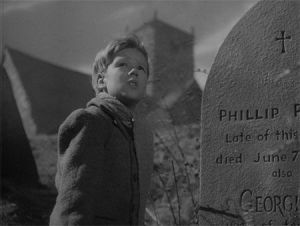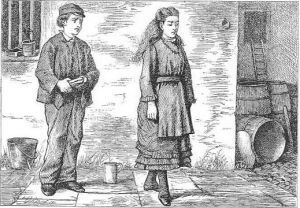Your Protagonist’s 2 Quests
As you begin to develop your PROTAGONIST you are going to have to give him a quest or story goal. He must WANT something. And he must WANT it very very bad.
Charles Dickens’ “Great Expectations” starts out with the Protagonist, Pip. He is young and alone in a church graveyard, trying to read his parents’ headstones, overcome by a feeling of fear and alienation.
Chapter 1
My father’s family name being Pirrip, and my christian name Philip, my infant tongue could make of both names nothing longer or more explicit than Pip. So, I called myself Pip, and came to be called Pip.
I give Pirrip as my father’s family name, on the authority of his tombstone and my sister—Mrs. Joe Gargery, who married the black-smith. As I never saw my father or my mother, and never saw any likeness of either of them (for their days were long before the days of photographs), my first fancies regarding what they were like, were unreasonably derived from their tombstones. The shape of the letters on my father’s gave me an odd idea that he was a square, stout dark man with curly black hair. From the character and turn of the inscription, “Also Georgiana Wife of the Above,” I drew a childish conclusion that my mother was freckled and sickly……
When searching a story for a protagonist’s WANT always take note of what the protagonist is doing physically (through his five senses.) Pip is doing two things: he is speaking his name and he is reading. Thus his WANT is for identity through literacy. The protagonist’s WANT can be derived from what he is physically doing at the outset of the story. I call this the WORLD’S QUEST.
But Dickens doesn’t stop there. And neither should you when you are creating your character. It is not enough to give your protagonist a WORLD’S QUEST: something he can attain through the five senses. For there is a second, even more powerful and important quest that must be present from the outset. Dickens goes deeper, creating this second quest:
…Ours was the marsh country, down by the river, within, as the river wound, twenty miles of the sea. My first most vivid and broad impression of the identity of things, seems to me to have been gained on a memorable raw afternoon towards evening. At such a time I found out for certain, that this bleak place overgrown with nettles was the churchyard; and that Philip Pirrip, late of this parish, and also Georgiana wife of the above, were dead and buried; and that Alexander, Bartholomew, Abraham, Tobias, and Roger, infant children of the aforesaid, were also dead and buried; and that the dark flat wilderness beyond the churchyard, intersected with dykes and mounds and gates, with scattered cattle feeding on it, was the marshes; and the low leaden line beyond, was the river; and that the distant savage lair from which the wind was rushing, was the sea; and that the small bundle of shivers growing afraid of it all and beginning to cry, was Pip.
That second quest is THE SOUL’S DESIRE. For Pip, the soul’s desire is to acquire a name for himself or identity that will free him from the agony of his orphaned state. He’s scared, alone and small as he gazes upon the tombstones of his parents. His soul seeks deliverance from the curse of death and abandonment. My GOD! If that doesn’t draw the reader in than I don’t know what will!
The SOUL’S DESIRE is the most important element in your entire story, so take lots of time in discovering the interior life of your Protagonist. The deeper that desire–the deeper it is carved into your protagonist and his surrounding world–the better satisfied the soul of your reader will be.
Something infinitely vulnerable has to live inside your protagonist. He must have a longing that aches—some kind of ailment or curse that makes living nearly impossible and needs healing. That vulnerable place cannot be healed through the visceral senses. It must be attained through the satisfaction of the soul.
Give your main character a SOUL’S DESIRE that is ENORMOUS, TRAGIC & HEARTRENDINGLY SAD.
Go ahead. You can do it. You can go deep. Make him the most broken person you have ever met. (A dish on a banquet table gets less attention than a fly on the wall, but smash that dish to the floor, and watch how the room is now rapt by those broken pieces.)
Once you access the SOUL’S DESIRE, plot, motivation, nuance, detail, arch, etc. will come to you organically and with little effort. But you have to do the hard work before you can get the reward.
If you’re not sure what the SOUL’S DESIRE is just yet, read the classics again. Read Dickens’ “Great Expectations.” If you’ve already read it, reread it; but this time, look for Pip’s SOUL’S DESIRE at every turn. What you will find is that Dickens did not fail in allowing that cavern of want, that “shivering bundle” of a broken boy to remain present on almost every page.
(Above is a picture of Pip with Estella. No longer longing for parents, he places all that longing upon her. He is always looking outward, searching for his Identity and SELF in the physical world. Never looking within. The pain in which he gazes upon Estella is a result of the SOUL’S DESIRE to belong to something, have access to knowledge and feel important.)
I would recommend reading several of the Classics, for they are the masters of the SOUL’S DESIRE and created characters that will live on forever.
Becoming a writer is about becoming a deep thinker. (Retraining yourself to become the scholar you once were.) We were all born deep thinkers. Sadly, though, in our present society we are trained to become visual, visceral and limited to the five physical senses. But we are not encouraged to be thinkers. Do not allow yourself to lose the biggest and best part of you!
You were born to tell a story and to change lives with that story—Never stop believing in that. Never stop searching for the SOUL’S DESIRE in your characters.
You will be amazed at what you learn from that quest and what can issue from your hand.





